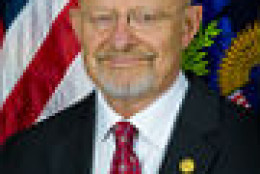Cybersecurity
-
Agencies should be archiving all business communication to avoid mayhem such as at the IRS. While the agency shifts blame from e-mail to instant messenger, Nancy Flynn, founder of ePolicy, told Federal News Radio that agencies need to better manage the many communication options.
July 22, 2014 -
By some estimates, taking out just nine critical electrical substations could plunge the whole nation into darkness. Threats to the electrical grid aren't just from cybersecurity, but also from a lack of physical security. The Federal Energy Regulatory Commission asked the Battelle Memorial Institute to look into security of the bulk electricity system. Jason Black is the research leader at Battelle. He joined Tom Temin and Emily Kopp on the Federal Drive to talk about his findings.
July 22, 2014 -
Federal officials say Chinese hackers broke into the networks of the Government Accountability Office and the Government Printing Office back in March. While news of Chinese cyber attacks on federal agencies isn't unprecedented, the March attacks, first reported by the New York Times, have some observers scratching their heads. They say it's unclear why those two agencies would be targeted -- particularly in the case of GPO. Steve Bucci is director of the Douglas and Sarah Allison Center for Foreign and National Security Policy at the Heritage Foundation. He's also former deputy assistant Defense secretary. He said the attacks shouldn't come as a surprise on In Depth with guest host Jared Serbu.
July 18, 2014 -
Cyber criminals are adjusting so quickly that it's become an 'arms race' between them and agency technology officers trying to guard against threats. During a recent Federal News Radio panel discussion, officials shared expertise and tactics for protection.
July 18, 2014 -
The nation's top intelligence official says transparency is going to have to be a feature of the intelligence community from now on. Gen. James Clapper, the director of national intelligence says that's his main takeaway from the Edward Snowden leaks and their continuing fallout. Clapper is the guest on the latest edition of AFCEA Answers on Federal News Radio. In this excerpt, he told host Max Cacas he makes no apologies for the programs Snowden exposed, but intelligence agencies need to do a better job of explaining why they do what they do.
July 17, 2014 -
The Justice Department is asking Congress for more resources to fight cybercrime. Yesterday, a top official told Senators cyber criminals are becoming so sophisticated that the department, and the FBI in particular, are adapting their tactics and tools on a minute-by-minute basis. That might not be fast enough. The FBI estimates 500 million computers are infected by botnets each year, meaning that there are 18 victims per second. Levi Gundert is a former secret service agent and now a technical lead with Cisco's Threat Research, Analysis and Communications team. He told Emily Kopp on the Federal Drive that the government deserves credit for building partnerships that can track and find cyber criminals.
July 16, 2014 -
Anne Altman, general manager of Federal Government for IBM, will discuss a wide range of contracting topics with host Mark Amtower. July 14, 2014
July 14, 2014 -
Despite steps forward, agencies fell short of their 2014 targets for cybersecurity. The Obama administration is pushing chief information officers to focus on priorities of continuous monitoring, phishing and malware, and authorization processes for 2015, according to the newly released cross-agency priority goals on Performance.gov.
July 14, 2014 -
Talent acquisition manager Mike Bruni will discuss how to get a job in what is a competitive and challenging federal market. July 11, 2014
July 11, 2014 -
Julie Perkins hosts a roundtable discussion of the latest developments in cybersecurity. July 11, 2014
July 11, 2014 -
Chinese hackers broke into OPM computer networks earlier this year with the intention of accessing the files of tens of thousands of federal employees who had applied for top-secret security clearances, according to a media report. OPM tells Federal News Radio, "neither OPM nor US-CERT have identified any loss of personally identifiable information."
July 10, 2014 -
When it comes to critical infrastructure cybersecurity, White House policy has federal agencies and the private sector joined at the hip. So it matters to the federal government how good the private sector is at cyber. Unisys and the Poneman Institute surveyed companies who operate critical infrastructure. The picture isn't great. Mark Cohn, the chief technology officer of Unisys Federal Systems, joined Tom Temin and Emily Kopp on the Federal Drive to discuss the results of the survey.
July 10, 2014 -
The Senate Intelligence Committee has approved the Cybersecurity Information Sharing Act. The legislation is designed to expand information shared about cybersecurity threats and defensive mechanisms between the government and companies and within the private sector. The goal is to combat the rapid increase in attacks on computer systems that have resulted in the theft of millions of Americans' personal information and hundreds of millions of dollars in losses for businesses.
July 09, 2014 -
The first change of command at U.S. Cyber Command is complete. General Keith Alexander made way for Admiral Mike Rogers recently. But new revelations from Edward Snowden are a reminder that the first four years of the combination of CYBERCOM and the National Security Agency aren't without controversy. William Lynn was Deputy Secretary of Defense when the Defense Department stood up Cyber Command. He wrote about the strategy behind it in Foreign Policy at the time. He is now Chief Executive Officer of Finmeccanica North America and DRS Technologies. He explained on In Depth with Francis Rose the chain of events that caused DoD leadership to stand up Cyber Command.
July 08, 2014 -
The Senate would like to grant new powers to federal chief information officers and update federal IT laws that haven't gotten much attention for the past dozen years. Those are a couple of the effects of new legislation the Senate Homeland Security and Governmental Affairs approved recently. One of the bills is the Senate version of the Federal IT Acquisition Reform Act -- the other is an update to the Federal Information Security Modernization Act, which Senators have been trying to modify for the past several years, without much success. She said on In Depth with Francis Rose the proposals are a big step in the right direction.
July 07, 2014











